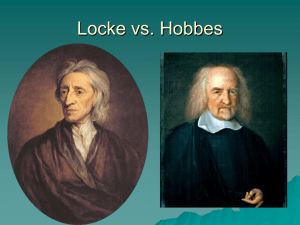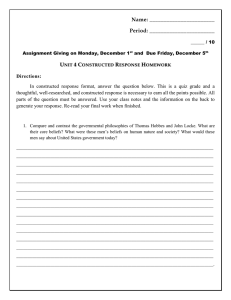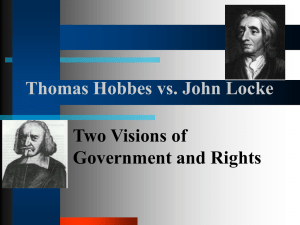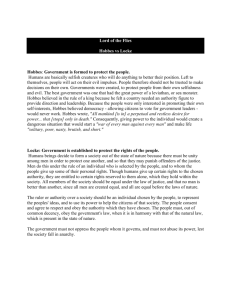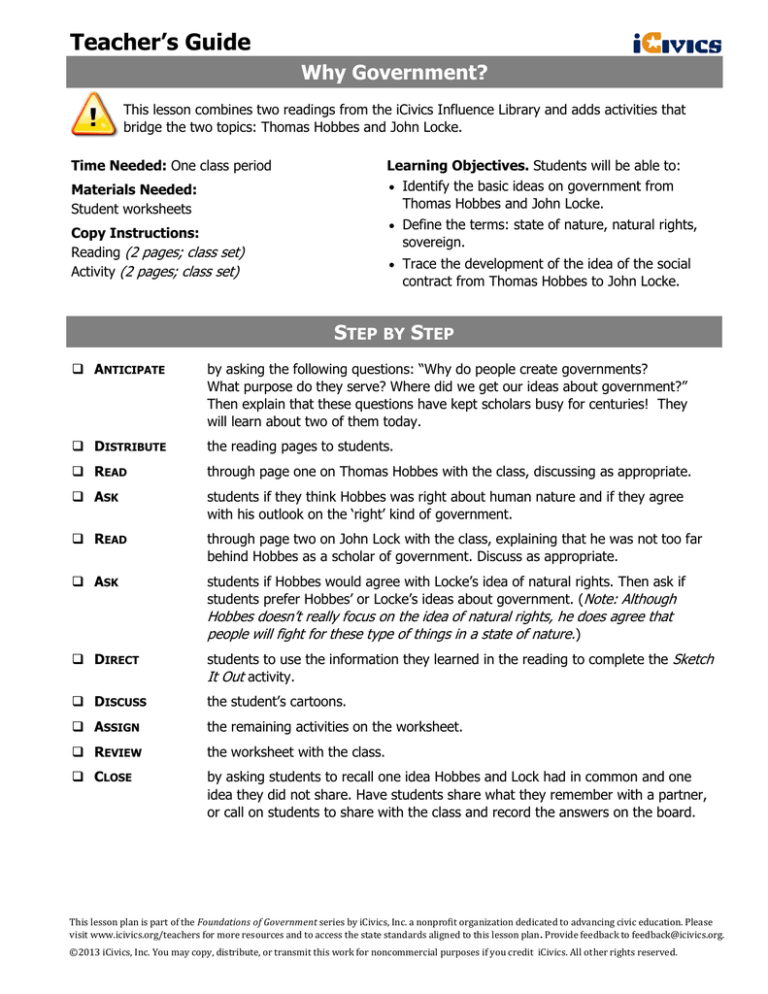
Teacher’s Guide
Why Government?
This lesson combines two readings from the iCivics Influence Library and adds activities that
bridge the two topics: Thomas Hobbes and John Locke.
Time Needed: One class period
Learning Objectives. Students will be able to:
Identify the basic ideas on government from
Thomas Hobbes and John Locke.
Materials Needed:
Student worksheets
Define the terms: state of nature, natural rights,
Copy Instructions:
Reading (2 pages; class set)
Activity (2 pages; class set)
sovereign.
Trace the development of the idea of the social
contract from Thomas Hobbes to John Locke.
STEP BY STEP
ANTICIPATE
by asking the following questions: “Why do people create governments?
What purpose do they serve? Where did we get our ideas about government?”
Then explain that these questions have kept scholars busy for centuries! They
will learn about two of them today.
DISTRIBUTE
the reading pages to students.
READ
through page one on Thomas Hobbes with the class, discussing as appropriate.
ASK
students if they think Hobbes was right about human nature and if they agree
with his outlook on the ‘right’ kind of government.
READ
through page two on John Lock with the class, explaining that he was not too far
behind Hobbes as a scholar of government. Discuss as appropriate.
ASK
students if Hobbes would agree with Locke’s idea of natural rights. Then ask if
students prefer Hobbes’ or Locke’s ideas about government. (Note: Although
Hobbes doesn’t really focus on the idea of natural rights, he does agree that
people will fight for these type of things in a state of nature.)
DIRECT
students to use the information they learned in the reading to complete the Sketch
It Out activity.
DISCUSS
the student’s cartoons.
ASSIGN
the remaining activities on the worksheet.
REVIEW
the worksheet with the class.
CLOSE
by asking students to recall one idea Hobbes and Lock had in common and one
idea they did not share. Have students share what they remember with a partner,
or call on students to share with the class and record the answers on the board.
This lesson plan is part of the Foundations of Government series by iCivics, Inc. a nonprofit organization dedicated to advancing civic education. Please
visit www.icivics.org/teachers for more resources and to access the state standards aligned to this lesson plan. Provide feedback to feedback@icivics.org.
©2013 iCivics, Inc. You may copy, distribute, or transmit this work for noncommercial purposes if you credit iCivics. All other rights reserved.
Why Government?
Name:
Nope, Not the Cartoon Tiger (the other Hobbes)
Thomas Hobbes was an English scholar and philosopher. He was born in
1588 and later became a tutor to a very wealthy family. As a tutor Hobbes
had access to many books, traveled often, and met many important thinkers.
Hobbes lived in Paris through the English Civil Wars and was interested in the
nature of government. He wrote about many topics, including politics,
geometry, physics, religion, and history. Hobbes was one of many scholars
who tried to answer the question, “Why do we have government?”
Thomas Hobbes
Poor, Nasty, Brutish, and Short
Hobbes saw humans as naturally selfish and quick to fight. He
believed that before there were governments, people lived in a
state of nature. In a state of nature, everyone had a right to
everything. In order to get what they wanted, people would always
be at war with everyone else. Nobody would produce anything like
inventions, art, or even crops or tools because they would be afraid
other people would take them away. Hobbes didn’t paint a very
pretty picture of life without government.
Social Contract
Hobbes lived at a time when many philosophers were thinking about
the nature of government. He was one of the first of his era to
discuss the idea of a social contract between people and their
government. A contract is an agreement in which both sides agree to
something in order to reach a shared goal. In Hobbes’ view, people
agreed to give up some rights and power in exchange for protection.
But for Hobbes, the social contract was no two-way street. He
believed that once the people agreed to hand over power in
exchange for protection, they lost the right to overthrow, replace, or
even question the government.
Leviathan
Hobbes wrote a book called Leviathan (luh-VI-uh-then) to explain how he
thought governments should work. Hobbes wrote Leviathan during the
English Civil War. He wrote about the social contract, and he spent much
of the book trying to show that a strong central authority was the only way
to avoid the evils of war. Hobbes believed a single sovereign, or ruler,
should have total authority over the people. He believed in a monarchy led
by a king. That’s because he thought that government would work best if
all the power rested in one place. No three branches for Hobbes!
Monarchy? Not Democracy?
Cover art from Leviathan.
Many political thinkers—including America’s Founding Fathers—built on
Hobbes’ ideas, especially the idea of a social contract. Hobbes was more
concerned with protection and order than rights. But people like John
Locke and Jean-Jacques Rousseau changed the focus from monarchy to
democracy—power with the people instead of a sovereign. They began to
see that people have rights that must be protected even from government.
Reading p.1
Why Government?
Name:
A Man with Many Hats
John Locke was born in England in 1632, at about the same time that
Hobbes was about to begin his life’s work as a philosopher. Locke
considered becoming a minister, started his career as a doctor, but ended
up as a philosopher and political scientist. He had many interests and
produced a number of writings that influenced future leaders. One of those
leaders was Thomas Jefferson, who helped America gain independence
from Britain nearly 150 years after Locke was born. Jefferson studied
Locke’s writings, and Locke’s ideas show up in our own Constitution.
John Locke
The Blank Slate
One of Locke’s books, called An Essay Concerning Human
Understanding, took over 18 years to write! In it, he says that people
are born with a mind like a tabula rasa, which means a blank slate
or page. During life, that blank slate gets filled up with the things a
person experiences with the five senses. He said people learn and
develop differently because they are exposed to different things. The
one thing people have in common is that they are human and share a
human nature that is the same for all people everywhere.
Natural Rights
Locke imagined a set of natural rights that human beings share.
These are the right to life, liberty, and property. Life refers to the fact
that people want to live and will fight to survive. Liberty means that
people want to be as free as possible to make their own decisions.
Property represents the fact that people want to own things that
help them survive, such as land, food, and tools. Locke believed these
rights aren’t given to people—people are born with them.
Why do we need a government?
Locke also wondered what life would be like if people didn’t have a
government. Like Hobbes, he believed this would lead to a state
of nature with no rules, no one in charge, and no way for people
to protect their natural rights. He believed the purpose of
government is to end the state of nature and give people certain
protections. But Locke also believed that governments should
protect people’s natural rights.
Social Contract
Locke believed a government can only be legitimate, or valid, if it is
based on a social contract with citizens. For Locke, the social contract
between a government and its people worked both ways: The people
agree to give up some freedoms, but only if the government agrees to
protect everyone’s rights. If the government fails to deliver, the people
have the right to revolt like the colonists did during the American
Revolution. This two-way exchange between citizens and government
was very different from Hobbes’ view.
Reading p.2
Why Government?
Name:
A. Sketch it out. Use words and images to create cartoons showing the ‘big ideas’ of Hobbes and Locke.
How would it
look? What’s
happening?
What’s not
happening?
Who is
involved?
What is being
exchanged?
Who is the
government?
Does it ever
change?
Activity p.1
Why Government?
Name:
B. Venn. Put the number of the word in the right category.
1. Natural Rights
6. No laws
2. Life
7. Laws
3. Liberty
8. Compromises are made
4. Property
9. You are on your own!
5. Government
10. Rights are protected.
C. What’s the connection? Describe how the words listed are connected to one another.
D. Agree or Disagree? Read each statement and determine if Hobbes and Locke would agree.
On the statement where they disagree, explain how Locke saw things differently.
Activity p.2
Why Government?
** TEACHER GUIDE **
B. Venn. Put the number of the word in the right category.
6
1. Natural Rights
6. No laws
2. Life
7. Laws
3. Liberty
8. Compromises are made
4. Property
9. You are on your own!
5. Government
10. Rights are protected.
9
4
5
1
7
3
2
10
8
C. What’s the connection? Describe how the words listed are connected to one another.
2.
Life, liberty and property are
all natural rights that people
are born with, according to
Locke.
In a state of nature, people
are constantly in a state of
war because there are no
laws.
A social contract happens
when the people agree to
give up some power and
rights in exchange for protection and services.
D. Agree or Disagree? Read each statement and determine if Hobbes and Locke would agree.
On the statement where they disagree, explain how Locke saw things differently.
Hobbes thought a monarchy was best, and that the people could never overthrow the sovereign
power. Locke believed that the government should be overthrown by the people once it failed
to serve and protect them.
Activity p.2


